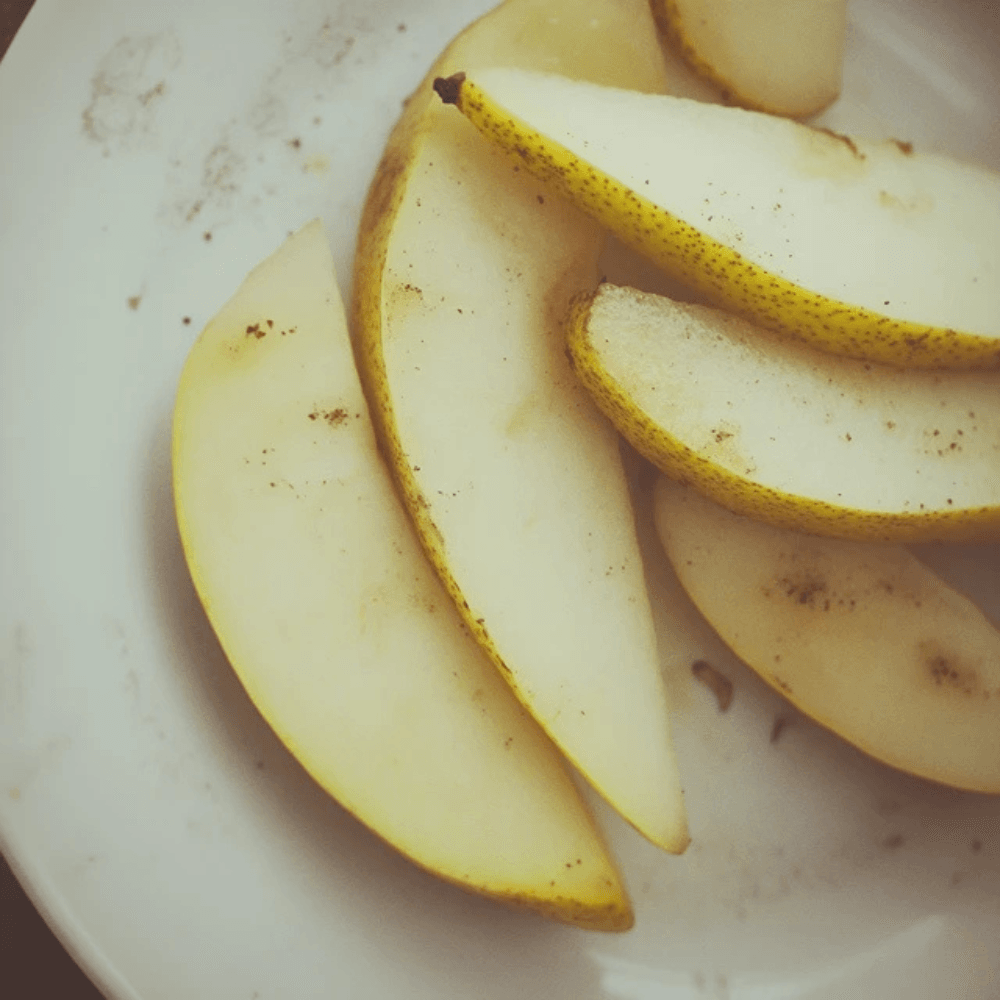Do Pears Burn Belly Fat? Well, Fruits are often considered a cornerstone of healthy eating, particularly for weight management and fat loss. Among these, pears are frequently highlighted as a top choice for their nutritional profile and potential fat-burning properties. But do pears actually help burn belly fat? This article delves deep into the topic, exploring scientific evidence, nutritional benefits, and practical ways to incorporate pears into a fat-loss diet.
Understanding Belly Fat and Its Health Risks
What is Belly Fat and Why Does it Matter?
Belly fat is more than just an aesthetic concern. It exists in two main forms: visceral fat, which surrounds internal organs, and subcutaneous fat, which lies just under the skin. Visceral fat is particularly concerning as it is metabolically active, releasing inflammatory markers that can contribute to health issues.
Not only does belly fat increase the risk of conditions like type 2 diabetes and heart disease, but it also affects hormonal balance. Maintaining a healthy weight and reducing abdominal fat are crucial for overall health and longevity.
Health Implications of Excess Belly Fat
Carrying excess weight in the abdominal area is linked to a variety of health concerns, including:
- Cardiovascular Problems: Belly fat is associated with increased LDL cholesterol and triglycerides.
- Metabolic Syndrome: A cluster of conditions like high blood sugar, increased blood pressure, and abnormal cholesterol levels.
- Insulin Resistance: Excess visceral fat can impair the body’s ability to manage blood sugar effectively.
Reducing belly fat requires a multi-faceted approach, including diet, exercise, and lifestyle changes.
Nutritional Profile of Pears and Belly Fat Loss
What Makes Pears a Superfruit?
Pears are often termed a “superfruit” due to their nutrient-dense composition. A medium-sized pear contains approximately:
- Fiber: 6 grams, fulfilling about 24% of daily needs.
- Vitamin C: Essential for immune health and skin repair.
- Potassium: Regulates blood pressure and supports heart health.
These nutrients make pears a staple in weight management diets. Fiber, in particular, slows digestion, prolonging feelings of fullness. Learn more about the “comprehensive pear nutrition facts” here.
Low-calorie benefits of pears for belly fat loss
Pears are an excellent choice for those looking to reduce belly fat due to their low-calorie content and high fiber levels. A medium-sized pear contains about 100 calories, making it a satisfying yet low-energy-density fruit.
Why pears are great for belly fat loss:
- Low-calorie yet filling: The combination of water and fiber in pears makes them naturally hydrating and filling, which reduces overall calorie intake.
- Low glycemic index: Unlike processed sweets, pears have a low glycemic index (GI), preventing sudden blood sugar spikes and reducing cravings.
- Rich in dietary fiber: Pears provide about 6 grams of fiber per fruit, promoting better digestion and supporting weight management.
- Naturally sweet without added sugars: Their natural sweetness helps satisfy cravings without relying on refined sugars or unhealthy snacks.
Including pears in a calorie-conscious diet can enhance satiety, prevent overeating, and support stable energy levels throughout the day, making them a great addition for belly fat reduction.
The Role of Fiber in Weight Management
How Does Fiber Aid in Losing Belly Fat?
Fiber is a key component in effective weight management, particularly in reducing belly fat. It absorbs water and forms a gel-like substance in the digestive tract, which slows digestion, keeping you fuller for longer and reducing overall calorie intake. This effect is especially beneficial for preventing overeating and controlling appetite.
Key benefits of fiber for belly fat loss:
- Prolongs satiety: Reduces hunger and prevents frequent snacking.
- Decreases visceral fat: High-fiber diets are linked to a reduction in dangerous belly fat.
- Boosts gut health: Encourages the growth of good bacteria, which influences metabolism and weight regulation.
- Stabilizes blood sugar: Prevents insulin spikes, which contribute to fat accumulation in the midsection.
Why Pears Are a Top Source of Fiber
Pears are one of the best fruit sources of dietary fiber, making them an excellent choice for weight management. While an apple provides about 4 grams of fiber, a medium pear contains approximately 6 grams, offering superior benefits for digestion and satiety. Their fiber-rich nature supports a healthy gut and aids in long-term weight control.
For more insights on the fiber content and health benefits of pears, check out this article that explores their numerous advantages in greater detail.
Do Pears Burn Belly Fat?
Although no single food can directly “burn” belly fat, pears can play a role in weight management by improving satiety, supporting digestion, and enhancing calorie control. Their high fiber content makes them a valuable addition to a balanced diet aimed at reducing excess weight. Scientific studies have shown that individuals consuming fiber-rich foods tend to have lower body fat percentages and better metabolic health.
Scientific Evidence Supporting Pear Consumption for Weight Loss
Scientific research highlights the importance of dietary fiber in weight loss. A study published in the Journal of Nutrition found that individuals who consumed higher amounts of fiber-rich fruits, such as pears, had lower body mass index (BMI) and reduced visceral fat levels. This suggests that pears, as part of a fiber-focused diet, can contribute to maintaining a healthy weight.
Additional research has pointed out that fiber slows digestion, leading to prolonged feelings of fullness, which can help reduce caloric intake throughout the day. Since weight loss is fundamentally tied to calorie balance, pears may indirectly assist in controlling appetite and preventing overeating.
Mechanisms by Which Pears Might Help Burn Fat
Several properties of pears contribute to weight management, including:
- High Fiber Content: A medium pear contains about 6 grams of fiber, which supports digestion, reduces hunger, and promotes a healthy gut microbiome.
- Low-Calorie Density: With a high water content and naturally low calories, pears allow for greater food volume without excessive calorie intake.
- Antioxidant Effects: Pears are rich in flavonoids, vitamin C, and polyphenols, which combat oxidative stress and inflammation—both linked to obesity and metabolic disorders.
- Inflammation Reduction: Chronic inflammation is a major factor in fat accumulation, particularly around the abdomen. By reducing inflammation, pears may create a more favorable metabolic state for fat loss.
While pears alone won’t melt away belly fat, their fiber, hydration, and antioxidant properties make them an excellent choice for those aiming to manage their weight effectively. Pairing them with a balanced diet, regular exercise, and healthy lifestyle choices will yield the best fat-loss results.
How to Incorporate Pears into a Weight Loss Diet
Easy Ways to Add Pears to Your Meals

Fresh pears are a nutritious choice for weight loss and belly fat reduction.
Pears are incredibly versatile and can fit seamlessly into a variety of dishes. Here are some easy ways to include them in your diet:
- Breakfast Boost: Dice pears and add them to oatmeal or yogurt for a naturally sweet topping.
- Midday Snack: Pair pear slices with a handful of almonds or a dollop of peanut butter.
- Salads and Sides: Include thinly sliced pears in green salads or pair them with goat cheese and walnuts.
These simple ideas not only enhance flavor but also help regulate blood sugar levels, keeping hunger at bay throughout the day.
Pear Consumption Frequency for Belly Fat Reduction
The ideal portion size for pears depends on individual dietary needs, but consuming one to two medium-sized pears daily is recommended for optimal benefits. Eating them during mid-morning or as part of an evening snack can curb cravings and reduce the urge for unhealthy foods.
Key Tip: Balance your diet with other nutrient-dense foods to maximize the fat-loss potential of pears.
Comparing Pears to Other Belly Fat-Reducing Fruits
Fiber Content Comparison: Pears vs. Apples
While apples are often touted for their health benefits, pears hold an edge in terms of fiber content. A medium pear contains around 6 grams of fiber, compared to an apple’s 4 grams. The additional fiber in pears provides enhanced satiety, making them a more effective choice for weight management.
Nutrient Comparison Table: Pears vs. Apples
| Nutrient | Pears (Medium) | Apples (Medium) |
|---|---|---|
| Fiber | 6g | 4g |
| Vitamin C | 12% of RDI | 8% of RDI |
| Calories | ~100 | ~95 |
Unique Advantages of Pears in Weight Management

Pears offer unique benefits due to their combination of high fiber and low glycemic index. Unlike tropical fruits like mangoes or bananas, pears stabilize blood sugar without causing spikes. This stability is crucial for managing hunger and preventing overeating.
Moreover, pears are rich in polyphenols, compounds that may enhance fat metabolism and reduce inflammation.
Potential Drawbacks and Precautions
While pears offer numerous health benefits, it’s essential to be mindful of potential drawbacks associated with their consumption. Eating them in excessive amounts or without considering individual sensitivities can lead to discomfort or unwanted effects.
Are There Risks to Eating Too Many Pears?
Although pears are a nutrient-dense fruit, overconsumption can lead to digestive discomfort due to their high fiber content. Suddenly increasing fiber intake—especially from whole fruits—can cause:
- Bloating and Gas: The fermentation of fiber in the gut can lead to excess gas production.
- Diarrhea or Loose Stools: The combination of fiber and the natural sugars in pears, such as sorbitol, can have a laxative effect, particularly when consumed in large amounts.
- Stomach Cramps: Excess fiber can slow digestion too much, leading to discomfort and irregular bowel movements.
To prevent these issues, gradually introduce pears into your diet if your fiber intake is currently low. Start with smaller portions and increase consumption over time to allow your digestive system to adjust.
Pro Tip: Drink plenty of water when eating fiber-rich foods like pears. Hydration helps fiber move smoothly through the digestive system, reducing the risk of bloating or discomfort.
Allergies and Sensitivities to Pears
While pear allergies are uncommon, some individuals may experience oral allergy syndrome (OAS) when consuming fresh pears. This condition occurs when the immune system mistakes proteins in raw fruits for pollen allergens, leading to symptoms such as:
- Itchy or swollen lips, mouth, or throat
- Tingling or mild irritation in the mouth
- In rare cases, more severe allergic reactions
These symptoms are more likely to occur in individuals with pollen allergies, especially those allergic to birch pollen. If you experience discomfort when eating pears, consider:
- Peeling the fruit: Many allergenic proteins are found in the skin.
- Cooking pears: Heat breaks down these proteins, reducing the likelihood of a reaction.
For those with severe fruit allergies, it’s advisable to consult a healthcare provider before consuming pears or related fruits. Understanding your body’s response to pears ensures you can enjoy their benefits without unnecessary risks.
Pears in a Balanced Diet
Pairing Pears with Other Healthy Foods
To maximize their weight loss benefits, pears can be paired with other nutrient-rich foods. For example:
- Combine pears with Greek yogurt and a drizzle of honey for a protein-packed snack.
- Add pears to a smoothie with spinach, chia seeds, and almond milk for a fiber- and nutrient-rich meal.
These combinations provide a balance of macronutrients and enhance the body’s fat-burning potential. Explore more ideas for “incorporating pears into a healthy diet” here.
Why Balance is Key to Fat Loss
Pears are a nutritious and beneficial addition to a healthy diet, but they should not be considered a standalone solution for belly fat reduction. Effective and sustainable weight loss requires a holistic approach that includes:
- Balanced Nutrition: A combination of different macronutrients ensures optimal health and metabolism.
- Lean Proteins: Supports muscle maintenance and promotes satiety (e.g., chicken, fish, tofu, legumes).
- Healthy Fats: Aids metabolism and hormone regulation (e.g., avocados, nuts, olive oil).
- Fiber-Rich Foods: Enhances digestion and keeps you full longer (e.g., pears, apples, whole grains).
- Regular Physical Activity: Exercise is crucial for calorie expenditure and overall fat loss.
- Strength Training: Builds lean muscle, which helps burn more calories at rest.
- Cardio Workouts: Supports heart health and promotes fat burning (e.g., brisk walking, running, cycling).
- Hydration and Mindful Eating:
- Drinking plenty of water supports digestion and prevents overeating.
- Practicing portion control ensures a balanced intake without excessive calories.
Pears can be a valuable part of a weight-loss-friendly diet, but combining them with diverse nutrient sources and an active lifestyle will yield the best long-term results.
Expert Opinions on Pears and Belly Fat Reduction
Nutritionists’ Take on Pears for Weight Loss
Dietitians often recommend pears for those looking to lose weight, particularly belly fat. The combination of high fiber, low calorie content, and essential nutrients makes pears a standout fruit. According to nutritionist insights, the dietary fiber in pears plays a significant role in appetite control, a crucial factor for reducing abdominal fat.
One registered dietitian highlighted, “Pears are ideal for managing weight because they satisfy hunger without adding excessive calories. They can complement any weight loss plan.” Moreover, pears support gut health, which is increasingly recognized as a key element in maintaining a healthy weight.
Fitness Coaches’ Advice on Incorporating Pears
Fitness trainers emphasize the importance of nutrient timing when consuming pears. Eating pears before a workout provides natural sugars and energy, while their fiber content helps maintain energy levels without the crash associated with processed snacks. Post-workout, pears can pair well with protein sources to aid recovery and keep cravings in check.
Including pears in pre- and post-workout meals not only supports overall nutrition but also contributes indirectly to fat-burning efforts.
FAQs About Pears and Belly Fat
Do Pears Burn Belly Fat on Their Own?
Pears alone cannot directly burn belly fat. However, their high fiber content and ability to curb hunger make them an excellent addition to a fat-loss diet. Incorporating pears into balanced meals helps reduce overall calorie intake and supports sustainable weight management.
How Many Pears Should I Eat Daily to Lose Belly Fat?
Consuming one to two pears a day is typically sufficient to reap their benefits. Pair them with protein or healthy fats to maximize their satiating effects. This strategy can prevent overeating and help in belly fat reduction over time.
Are Pears Better Than Apples for Weight Loss?
Both pears and apples are excellent choices for weight loss, but pears offer more fiber per serving. This additional fiber gives pears a slight edge in promoting satiety and supporting digestive health, making them particularly effective for reducing belly fat.
Can Pear Juice Replace Whole Pears in Weight Management?
While pear juice contains some nutrients, it lacks the fiber present in whole pears. Fiber is crucial for satiety and blood sugar control, which are key for managing belly fat. Whole pears are a better choice for weight loss than their juiced counterparts.
What’s the Best Time of Day to Eat Pears for Fat Loss?
Morning or mid-afternoon are ideal times to eat pears. Consuming them early helps control hunger throughout the day, while their natural sugars provide an energy boost without causing blood sugar spikes.
Final Thoughts on Pears and Belly Fat Reduction
Pears offer numerous health benefits, from supporting digestion to providing essential nutrients that aid in weight loss. While they may not directly burn fat, pears are an excellent addition to a weight loss plan, thanks to their high fiber content and low calorie count. By promoting satiety and helping control cravings, they can support efforts to reduce abdominal fat.
Do pears burn belly fat? Not on their own, but their role in a balanced diet and healthy lifestyle cannot be overlooked. Incorporating pears into your daily meals—whether as a snack, a smoothie ingredient, or a salad topper—can promote satiety, prevent overeating, and provide essential nutrients for overall health.
A balanced approach that includes regular physical activity, portion control, and a variety of nutrient-rich foods, including pears, is key to achieving long-term weight loss and reducing belly fat. By making pears a part of your routine, you’ll not only enjoy their delicious flavor but also take another step toward a healthier lifestyle.






